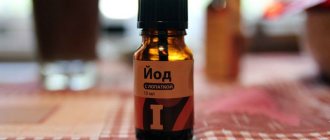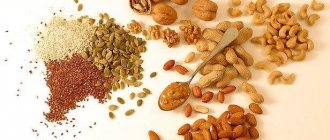Iodine is an important element for the normal functioning of the thyroid gland. The hormone, in the synthesis of which iodine takes part, ensures water-salt metabolism, metabolism, heat exchange, normal functioning of cells, the functioning of the liver, heart and blood vessels, and the calmness of the nervous system also depends on it.
With insufficient iodine intake, iodine deficiency develops and disruptions in the body's functioning are noted. For example, a person may complain of forgetfulness, become more irritable, have drowsiness and other problems. Often, due to malfunctions of the thyroid gland, weight may change towards increase.
Related article Why do doctors no longer recommend treating wounds with iodine?
The average iodine requirement for adults, according to WHO, varies within different limits depending on the person’s condition. So, for example, for pregnant women the dosage is higher, for children the numbers are slightly lower. At the same time, various studies show that people often seriously lack such an important micronutrient. In any case, if there is a need to take iodine, you should consult with your doctor about how much and in what courses this should be done.
Despite the high importance of iodine for the human body, there is a lot of data and information that is unknown to many. AiF asked the doctor what exactly you need to know about such a useful substance. Elena Gubkina, an endocrinologist of the highest qualification category, tells the story
How much iodine does a person need per day?
Hormones produced by the thyroid gland are directly involved in the development of cells of the central nervous system, as well as skin and hair, so pregnant and lactating women should receive the maximum dose of iodine. For them, the daily dose is about 210 mcg per day. For an adult, 150 mcg of iodine is enough .
Children under two years of age need to be provided with at least 50 mcg of iodine. From two to six years, this dose should double. Well, schoolchildren need approximately 120 mcg of iodine per day.
Instructions for using iodine
When using an alcohol solution of iodine externally, a cotton swab is moistened and used to treat lesions on the skin.
It is not recommended to use this product for more than 10 days.
The drug is taken orally after meals with preliminary dissolution in milk, and the dose is selected individually and depending on the indications.
When treating the surgical site, the skin is wiped twice with a sterile gauze swab moistened in a solution of this drug. In this case, the processing time is 4-6 minutes.
Iodine can also be dropped into the ears or applied to the affected skin in the form of a moistened gauze bandage.
The use of radioactive iodine is possible only in hospital settings, and for the safety of others, patients are allocated a separate room.
A capsule is prepared for the examined patient, which contains the required dosage of this microelement.
The capsule is taken orally with a sufficient amount of water.
After taking this drug, the patient is isolated for 5 days, and the therapeutic effect appears only after several months.
The Iodine active supplement is taken by children over 14 years of age and adult patients, one tablet once a day with meals. Modern daily norms according to age:
- Young children (under 6 years): 90 mcg.
- Children aged 7-10 years: 120 mcg.
- Adolescents and adults (11–51 years): 150 mcg.
Interesting! The World Health Organization (WHO) recommends increased iodine intake for pregnant women - up to 250 mcg per day.
What foods contain iodine?
The most iodine is found in seafood . It is known that the inhabitants of the sea elements are able to accumulate iodine from salt water. In particular, just 150 grams of seaweed, or kelp, can provide the daily dose of iodine that an adult needs. Fucus contains a fairly large amount of iodine, but in our country it is quite difficult to find this algae in stores.
Cod liver is quite rich in iodine. Just 100 grams of this product contains about 350 mcg of iodine. Raw sea fish, such as flounder, halibut or herring, contain 100 to 200 mcg of this valuable micronutrient. Approximately the same amount of iodine is contained in 100 grams of squid, mussels, oysters and shrimp.
It should be remembered that iodine is a rather unstable compound that can volatilize during heat treatment. Therefore, it is advisable to consume seafood not fried: it is recommended to stew or boil them.
You cannot exclude cheeses and shelf products from your diet, which contain about 11 mcg of iodine per 100 grams of weight. Approximately 7 mcg of iodine is found in potatoes, carrots, tomatoes and sorrel.
Persimmons, strawberries, lemons and grapes contain no more than 5 mcg of iodine per 100 grams of weight. Therefore, nutritionists recommend purchasing fruits and vegetables that are grown in soils enriched with iodine.
We must not forget about such a valuable food product as chicken eggs. One egg contains not only proteins and fats that are valuable for the body, but also approximately 12 mcg of iodine.
Many people try to compensate for iodine deficiency in their diet by consuming special iodized salt. Just two grams of this salt can completely replenish the daily volume of this valuable microelement. Iodized salt was invented in America, where at the beginning of the last century there was a significant increase in the number of children born with cretinism (a severe form of mental retardation). Children with mental retardation were born in places where the soil, and therefore food, was not rich enough in iodine.
It is important to remember that iodized salt will only be effective if you add salt to your food after cooking. Otherwise, the iodine will evaporate during heat treatment.
Storage conditions
The drug is stored out of the reach of small children, protected from bright light, at a room temperature not lower than 0 C.
It is also recommended to place the container with the medicine in a small plastic bag.
The date of manufacture of this product is checked at the pharmacy when making a purchase.
Information about the composition is placed on the label or on the cardboard packaging box.
Storage rules:
- storage possible at the bottom of the refrigerator door;
- Placement in the bathroom is not recommended due to temperature changes;
- It is prohibited to store iodine in the freezer due to its freezing and impossibility for further use;
- Iodine must be stored in the refrigerator when the air temperature exceeds +25 C.
The shelf life of iodine after opening does not exceed 6 months, since its use with a changed structure becomes dangerous to human health.
The quality of the alcohol solution decreases with its active use and the lid is not tightly closed.
After two years, the use of iodine for treating cuts and wounds is impossible, and the dosage form of the drug does not matter.
Any storage method necessarily requires a responsible and correct approach.
After each use, the bottle must be tightly closed, and before using the composition, a visual assessment of its current condition is required.
Lack of iodine and excess weight
Hormones produced by the thyroid gland take part in a number of metabolic processes, in particular, in the breakdown and accumulation of fats and carbohydrates. If there is a lack of iodine in the diet, the thyroid gland changes its operating mode. In the process of evolution, a special mechanism has been developed: if the body is in danger in the form of a lack of food, the endocrine system begins to “work” to create reserves. As a result, fat deposits are formed, which often becomes the cause of obesity. At the same time, the production of growth hormones decreases: all metabolic processes in the body slow down in order to “wait out” the difficult period. This also affects the functioning of the nervous system: a person becomes inhibited, his memory deteriorates and his ability to concentrate decreases.
Benefits of Iodine
The benefits of iodine for the human body are very great:
- taking part in the synthesis of hormones;
- support for the operation of the exchange system;
- regulation of the thermoregulation system;
- strengthening hair, teeth and nails;
- maintaining normal body weight and rapid breakdown of fat tissue.
Iodine is responsible for the human immune system, since its normal amount produces phagocytes that fight pathogenic microflora.
The substance also helps maintain the musculoskeletal system and muscular system in normal condition.
Sanatorium treatment on the sea coast is very effective. Iodine is present in large quantities in sea water.
Therefore, if it is deficient, regular sea bathing is beneficial, during which iodine enters the body through the skin.
Why is iodine deficiency dangerous?
If the body does not receive the required amount of iodine for a long time, the following symptoms are observed:
- the thyroid gland increases in size (goiter develops);
- the functioning of the endocrine system suffers;
- children experience delays in both physical and intellectual development;
- drowsiness, constant feeling of fatigue, lack of energy;
- deaf-mute;
- disorders of the reproductive system: impotence, infertility, fetal development abnormalities, etc.
A lack of iodine in the diet may also cause problems with the cardiovascular and respiratory systems.

How to check for iodine deficiency
A lack of iodine in our country affects 40% of the living population, which has a serious impact on intellectual abilities, energy metabolism and the state of the immune system of people.
The main signs and causes of iodine deficiency in the body are:
- rapid growth, severe physical overload and severe stress;
- lack of zinc and various vitamins in the body;
- excess bromine, fluorine and chromium;
- excess chlorine and calcium content in drinking water;
- taking medications containing lithium salts and sulfonamides.
A simple way to determine iodine deficiency is to apply an iodide grid to the surface of the skin in the evening, with the exception of the thyroid gland area.
Complete absorption allows you to determine the existing deficiency.
A more accurate way to determine the lack of this important trace element is to apply thin, thick and even thicker lines on the forearm with a cotton swab at night.
A serious deficiency is determined if there are no lines at all on the forearm in the morning.
You can also determine iodine deficiency in the body using a urine test, since 80-90 percent of this element is excreted by the kidneys.
Low intake of this microelement into the body will be determined by its low excretion in urine.
More accurately, the iodine content will be shown by a test to determine the level of thyroid hormones.
Do I need to take iodine-containing medications?
Only a doctor can decide whether a person needs to take iodine. Typically, taking medications containing iodine is recommended:
- during pregnancy planning;
- during pregnancy and breastfeeding;
- newborns whose mothers suffer from iodine deficiency;
- during heavy mental stress (during exams or when working on important projects).
Iodine is one of the most important elements necessary for the normal functioning of the body. However, we must not forget that excess iodine is no less dangerous than its deficiency. It is important for every person to eat right: only a balanced diet will provide the body with everything necessary for its normal functioning. Only a doctor can decide whether a person needs additional medications containing iodine.
Iodine during pregnancy
With a lack of iodine, the normal functioning of the endocrine system and especially the thyroid gland is impossible, and the work of this important organ has a direct impact on the general condition of the body and sexual function.
Improperly functioning internal secretion organs often lead to the development of endocrine infertility, which is why dietary supplements are used even when planning pregnancy.
The lack of this microelement during pregnancy threatens serious deviations in the child’s physical and mental development.
The degree of lag in this case is influenced by the level of iodine deficiency; for example, with acute deficiency, a severe irreversible change called cretinism develops.
This microelement plays an important role in strengthening the skeleton of the unborn child, and in cases of acute deficiency they suffer from chronic hypoxia.
Children are born with reduced immunity and get sick quite often.
But excess iodine is no less dangerous than its deficiency. For example, with the simultaneous use of 50 mg of iodine, death may occur.
An excess of this microelement during pregnancy often causes miscarriage, so it is not recommended to indulge in taking dietary supplements without the prescription of a medical specialist.
Excess often occurs due to excessive consumption of various drugs and foods high in this chemical element.
This is also caused by a violation of iodine metabolism in the body. This requires the help of a qualified doctor who will select medications and help in adjusting the diet to reduce harm.
The dosage of the drug when planning and carrying a pregnancy is prescribed by a doctor strictly on an individual basis after tests at an average dose of about 200 mcg per day.
It can be divided into 2 parts in the form of two small tablets of 100 mcg. The duration of taking the drug depends on the individual indicators present.
In some cases, it is possible to take a special iodine supplement before childbirth and during feeding.











